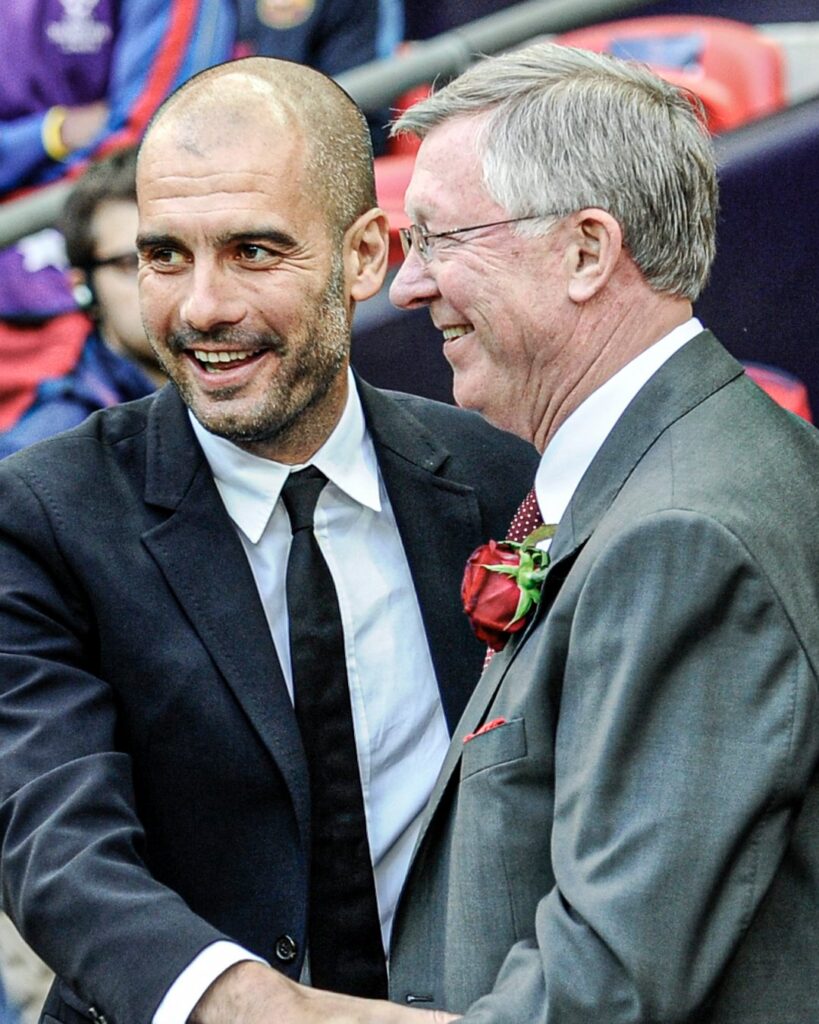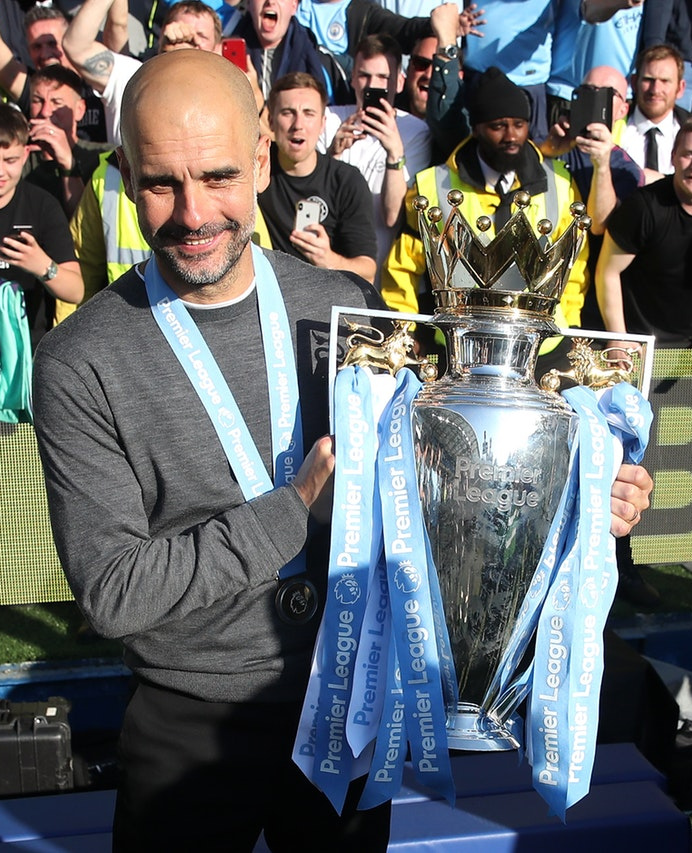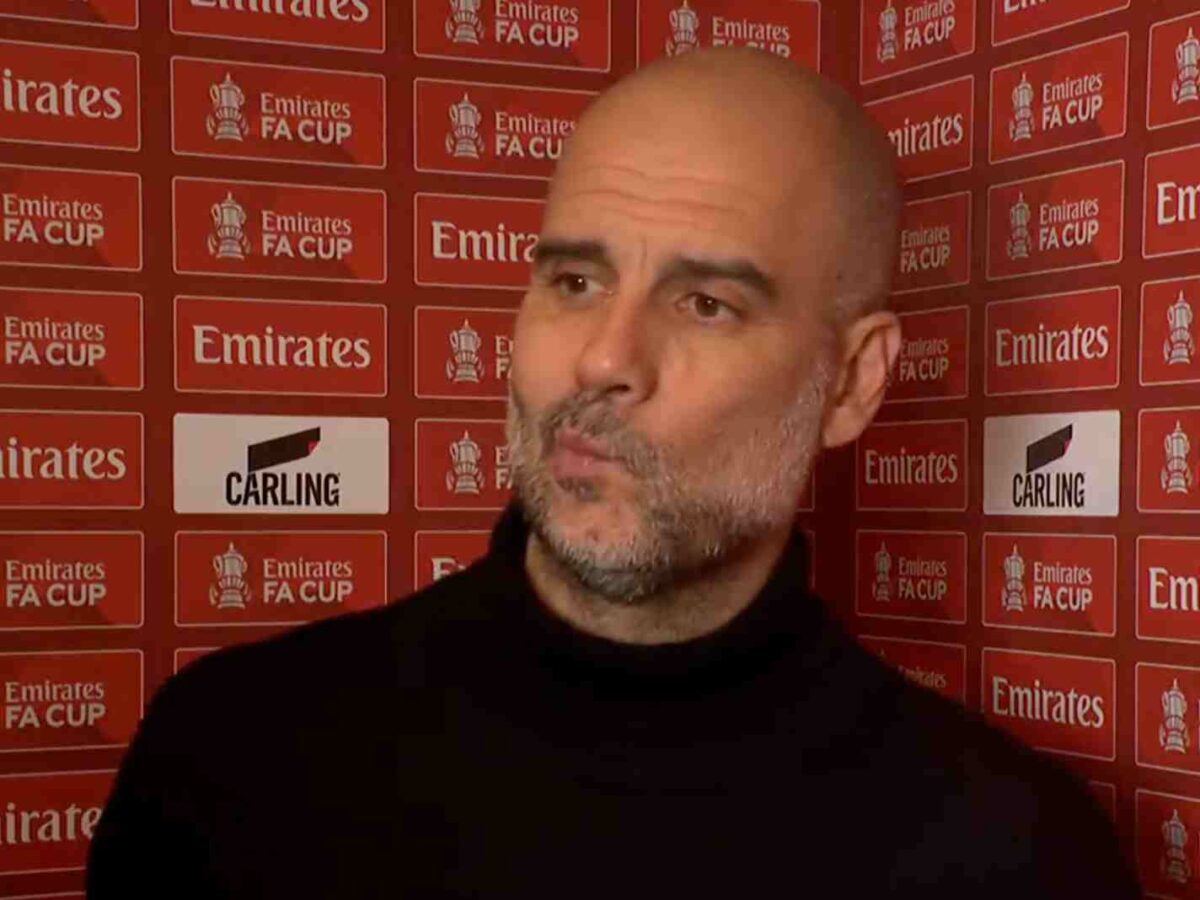Pep Guardiola will long be remembered as one of the most decorated personalities to ever grace the sport of football. More recent football fans will remember him for being an iconic manager who has achieved major success everywhere he’s been.
Be it starting his career in amazing fashion at Barcelona, whom he helped to multiple La Liga and Champions League titles – or spending a successful stint in Germany with Bayern Munich – who also won multiple Bundesliga titles under his reign.
Guardiola has achieved the majority of his success, however, at Manchester City. On Saturday, 20 May – the Spaniard saw his side clinch their fifth Premier League title under him and win their third-successive league trophy too – something only emulated by Sir Alex Ferguson’s Manchester United in the Premier League.

Pep has revolutionized things at Manchester City and has inspired them to lodge a realistic push for the European treble. In English football history, only the 1998/99 Manchester United side remains the only team to have done the European treble – which involves winning the Premier League, FA Cup and Champions League title in one single season.
Guardiola is already scripting his place among the greatest managers of all time. His philosophy is similar to his mentor at Barcelona, the late great Johan Cruyff, while his current playing style is a modernized and tweaked version of Total Football.
While the Spaniard is widely recognized as a legendary football manager, his heroics as a coach sometimes seem to overshadow the impressive playing career that Pep also enjoyed. Guardiola fell in love with the beautiful game at a very young age and started playing football at the age of 10 – joining local side Gimnàstic Manresa in 1981 before joining Barcelona’s La Masia academy three years later.

Guardiola had his first meet with Cruyff just a week after he joined the academy and it was the iconic Dutchman who urged the youth team coaches to ensure that Pep plays as a defensive midfielder in a midfield pivot. Thus started the Spaniard’s journey to becoming a fantastic midfielder who was brought up under Cruyff’s ideology and soared to bigger heights in his career.
Pep played for Barcelona for 11 years, winning six La Liga titles as a player as well as being part of the club’s first-ever Champions League win in 1992. He wasn’t as fancy as someone like Rivaldo, nor did he have the fanfare of someone like Luis Figo. Guardiola played a role as a defensive midfielder where there weren’t many eyes on him, but did his job so perfectly that he remained a core part of Barca’s success under Cruyff’s management.
In 2001, Guardiola decided to leave Barcelona and move to Italy for a new chapter in his career. He joined Serie A club Brescia, but disaster struck soon after he joined them. Just a few months after joining Brescia as Andrea Pirlo’s replacement and featuring his side’s 4-0 loss to Lazio, Pep was charged for being guilty of testing positive for using a steroid named nandrolone.
This steroid is claimed by some as being rocket fuel for the muscles as it helps the user strengthen themselves physically, but is illegal in the world of football. It is a performance-enhancing drug that helped footballers play with higher intensity than usual and Pep wasn’t the only one accused or guilty of using it either. Not only did it help with muscle growth, but also accelerate tissue repair after damage – which enables one to recover quicker from intense training sessions and avoid injury. Moreover, the drug also helped accelerate increased red blood production, which is a desired outcome for athletes.
A number of footballers in Italy around that period were found guilty of using the steroid. This included Manchester United legend Jaap Stam, Juventus midfielder Edgar Davids and even Frank de Boer – who all received bans after the start of the new century after being found guilty of doping.

The Italian football federation slapped Guardiola with a four-month ban and fined him a hefty €50,000 after he tested positive for using the steroid for the second time in the space of one month. Guardiola, however, was adamant to prove himself innocent and refused to accept the charges towards him – even though he did have to see through the ban.
While it is strictly prohibited in modern-day football, doping among footballers in Italy was quite a regular thing in the 1990s. The laws weren’t as strict then and many ended up exploiting that to a certain extent.
Guardiola, however, decided to fight through his charges and prove himself innocent in the eyes of the law while he kept playing in Italy. He didn’t however, really get to excel in Italy – making just 11 appearances in his debut season for Brescia before joining AS Roma in 2002. He only made five appearances for them before re-joining Brescia in January 2003 and making 13 appearances for them – before leaving the country to go play in Qatar later that year.
The doping case, however, ended up dragging on for years and ended before a final verdict could come to the fray. Guardiola appointed a brilliant legal team and in 2007, he saw himself get cleared on the appeal of all charges related to the ban in 2001.
A summary of the case stated: “Josep Guardiola was wrongly convicted in May 2005 of using the steroid nandrolone while playing soccer (football) for Serie A side Brescia in 2001. Guardiola was sentenced to a seven-month suspended prison term, and he was banned from playing soccer for four months and fined €50,000. He was the first soccer player convicted and sentenced under an Italian law created in 2000 that made doping a criminal offence. On October 23, 2007, an Italian appeals court overturned his conviction based on new scientific tests unavailable at the time of his prosecution that proved the steroid was not in his system.”
The Italian National Olympic Committee (CONI) however decided to reopen the case after considering the clearing of the charges to be unacceptable. Guardiola, although, was able to fight against them legally too and got cleared of the charges once again in 2009 – at the point when he had retired as a football player and was the Barcelona manager.
Legally, Pep was never found guilty to have used any performance-enhancing steroids or doping and the charges against him resulted in him having an uneventful period in Italy. So if Guardiola decides to never manage a Serie A club in his career, this particular case could be a reason behind his hesitation.



